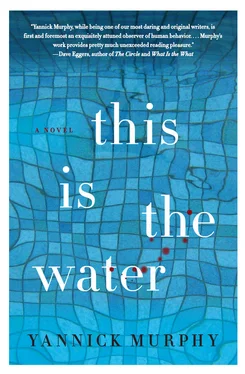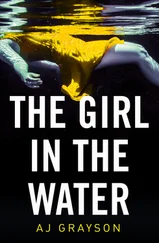But that mother and the father of that poor girl Kim, who was murdered, Dinah liked them. At away meets, the mother, Gina, would always save seats on the bleachers for the other parents by putting down extra sweaters or jackets. Poor Gina. Dinah can’t imagine what she’s going through, having a daughter who was murdered. Dinah feels glad she doesn’t know what Gina is going through. At the moment, it’s hard enough to be going through what Dinah is going through herself, watching her daughter cheat in her workout. Her daughter is getting out of the water and heading toward the bathrooms, though she just visited them not even half an hour ago. This is another tactic Dinah knows her daughter uses to get out of doing the complete workout. Dinah, not having her daughter to look at through her binoculars, uses them to look at the other parents sitting in the bleachers. She doesn’t see the usual suspects. Where are Paul and Annie? She thought for sure they’d be sitting together, their knees touching, Annie tossing her graying hair behind her shoulder like a teenager, and Paul the whole time not looking at anything else but Annie. They are not here tonight. Neither of them. Dinah is tempted to go out and see if they are together in the lobby, talking at one of the high café tables with the high chairs that once took such an effort for her to lift herself up onto. Or maybe they are sitting outside in one of their cars. Dinah has noticed how many parents do that. They sit in each other’s cars with the lights on and chat with each other until their children are finished with practice. She can see them in the dark some nights, lit up by their overhead ceiling lights, eerily glowing from within, laughing, talking, sharing snacks that are meant for their children but that they can’t resist partaking of themselves, the dinner they will eat still a long way off considering how far they live from the facility. Dinah is almost ready to go outside and check to see if Paul and Annie are in a car together, when her daughter comes back from the bathroom and dives into the pool to finish her workout. Dinah fixes her binoculars on her daughter now. The set is a breaststroke, her daughter’s best. She is gaining on the girl who has already taken off from the wall and is ahead of her daughter in the next lane over. Dinah wants to call out her daughter’s name, and then she wants to call out, “Go, Baby, go!” and she almost does, until she remembers that this is not a meet and this is not a race, but only a practice, on a rainy Monday night, just hours after she has told her husband, very loudly so that he could hear, that she is through with being married. “Done,” she said. She wanted to add, “Up to here,” and motion to her neck with a hand that looked as if it were slicing her head off, but really it is higher, where she is fed up. It is way past her neck. It is as high as the bit of stray hair that stands up from her head, and then some, that she is fed up. It is up to the rafters of the facility, where the ventilation ducts cross. It is through the sliding-glass roof that is opened on warm, stultifying days caustic with the smell of chlorine, and it is all the way up to where the glorious china-blue sky can be seen. Dinah puts down the binoculars now and slumps slightly in the bleachers. The practice isn’t even halfway over, and she is so tired. She just wants to go home and sleep, but the first thing she will do before going to bed will be to take those antlers off the wall above her four-poster. Tonight, she swears, she will sleep for once without hearing deer trampling through her dreams.
This is Paul trying to decide what to do. He is sitting with his hands on the sides of his face looking at a painting of the man his wife calls the killer. It has been months since he has been in her studio, but he is in her studio now, wanting to ask about who is going to drive Cleo to the next meet coming up. No one told him when he was standing before the priest on his wedding day that someday he might have to consider whether or not she needed mental help. “This is insane,” he says, and gestures toward the painting. He doesn’t like how the eyes of the man in the painting stare at him. What has gotten into her? “It’s him. I know it’s him,” she says. “Chris, what’s gotten into you?” he says. It’s so difficult talking to her these days. She doesn’t seem to answer him when he asks simple questions. She almost imperceptibly inclines her head toward her shoulder, as if there’s a small person perched there whom she’s acknowledging, but she doesn’t open her mouth to speak. If only it were Annie he was talking to instead. From her he knows he could get a straight answer, and Annie, at least, would be looking directly at him when he asked the question. He thinks of Annie as his muse. It was after he met her that he started writing the Bobby Chantal story in earnest. Before that he was just staying late at his office toying with a way to approach it. The actual writing of the story didn’t start until after he met Annie. Annie’s gray hair, almost white, framing a face that seems younger than the hair surrounding it, reminds him of his own mortality, reminds him he only has a finite time in this world to write fiction that matters before he too starts to turn gray and, eventually, dies. Annie is also so grounded and strong, so much the opposite of Chris, who right now is grabbing her car keys, saying she just needs to go for a drive.
When he walks back to the house from the studio, Cleo is standing in the doorway. “What was that all about?” she asks. Paul can only shake his head. “Your mother will be back later. It’s time for you to go to bed,” Paul says. He puts his arm around Cleo as they walk back into the house. He notices how strong and round her shoulder muscle feels beneath his hand. “My God, you’re getting fit,” he says. Cleo smiles. “Coach is working us harder than ever. She says it’s her tribute to Kim. She says if we all swim harder then it’s as if Kim didn’t die in vain. And guess what? I’m leading my lane now.” Paul says, “No, really? Well, that’s great, Cleo.”
This is Paul, alone in bed, remembering all too vividly that night he spent with Bobby Chantal and how they kissed and had sex on the picnic table that was up on the hill.
This is Paul’s computer in his office. It holds the first few pages of the story he’s writing about that night with Bobby Chantal. It is not a story he thinks he will ever try to publish. It is a story filled with too many personal details that would implicate him in the murder. First of all, it describes Bobby Chantal to a T. From the freckles on her nose, and her soft light-brown hair, down to her white-soled nurse’s shoes, which she said she kept looking white by covering the smudges with Wite-Out. It also describes Paul, a first year college student, with hair that was so dark it almost looked black, hair tied behind his head in a ponytail. It details the rest stop, with its picnic table, and with its view that had the ability to send Vietnam vets back in time with flashes of recognition so striking that sometimes they were left staring into the darkness of a deep depression. The story is like a written confession by a man who cannot help embellishing the facts and turning them into a story. It was when he first started staying late at his office, trying to plan the story, that Chris started accusing him of cheating. Maybe, in a way, he is cheating on her. He comes to the office most evenings after dinner to work on it. He sometimes even wakens with an idea or a detail for the story he hadn’t remembered, and rolls away from Chris’s warm body and gets into his car and drives to his office to write it down. He knows that reading the news article about the serial killer in Colorado, who was finally caught after strangling his last victim, and the news of Kim being murdered are the reasons he has been thinking about Bobby Chantal so much again. He knows it is the reason his nightmares are more frequent, and why in them he keeps trying to bring Bobby Chantal back over and over again. In truth, his memory of Bobby Chantal and his writing the story have been consuming him. He is not concentrating well in his teaching. He is reading students’ work without even leaving a constructive comment. He writes “Fine job” on the last page of their work, or something just as nondescript, when really their writing could use helpful criticism throughout. What do I really know about writing anyway? he thinks. He is doubting his own ability to tell the story. He feels that if he can get the story right, then somehow he’ll be rid of the guilt. I’m not stupid enough to go to the police and tell them I was there the night of her murder, he tells himself. That could ruin my life, and the lives of Chris and Cleo as well. But writing the story in a way that exposes the humanity within him, that might help. It might redirect his thoughts, so that while he is eating dinner with his family he might have a conversation with them instead of staring at the salt shaker and thinking of how small leaves and blades of grass were mixed in with Bobby Chantal’s blood on her face and the front of her dress when he turned her over and saw the slit in her neck that ran from ear to ear, like the proverbial second smile that so many other victims murdered by having their throats cut are described as having. And best of all, getting past writing the Bobby Chantal story might just get him back to writing work that can be published again. There are stories inside him he wants to tell, only right now it’s as if Bobby Chantal isn’t going to let him write them unless he writes her story first.
Читать дальше












